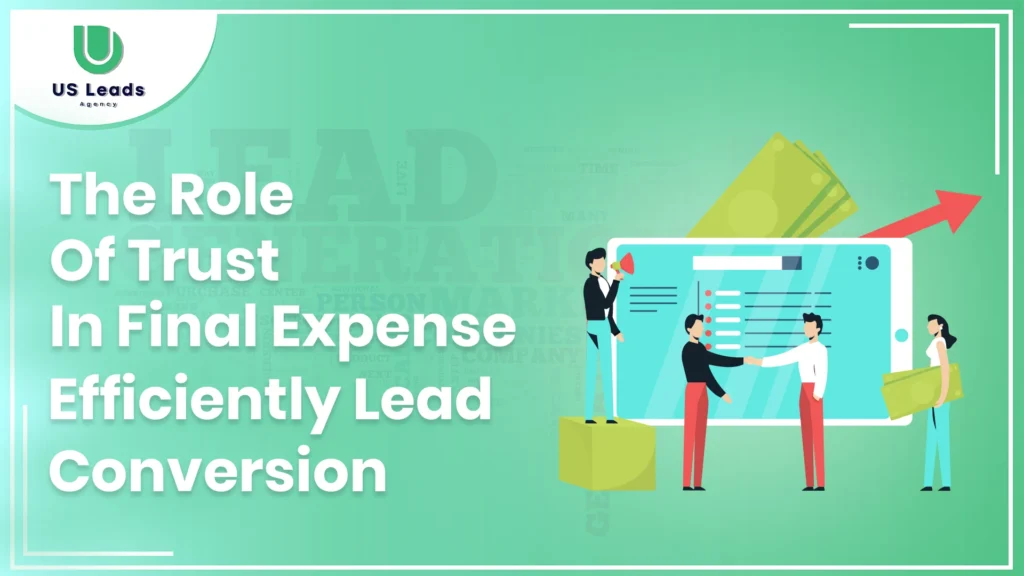
Final expense insurance provides families with peace of mind during emotionally challenging times, covering end-of-life expenses like funerals and burials. For insurance agents, successfully converting leads into policyholders requires more than competitive pricing or persuasive sales tactics, it demands trust. In a market where decisions are deeply personal, trust serves as the cornerstone for converting final expense Facebook leads, direct mail final expense leads, or real-time final expense leads into loyal customers.
This article delves into the role of trust in final expense lead conversion and strategies to build it effectively.
Key Takeaways:
- Trust is critical for converting final expense leads for telesales or other channels into policyholders.
- Transparency, empathy, and reliability are vital for building trust.
- Social proof and education help position agents as trusted advisors.
- Trust-building efforts directly correlate to improved lead engagement and conversion rates.
Table of Contents
What Is Final Expense Lead Conversion?
Final expense lead conversion refers to turning potential customers who show interest in final expense insurance into policyholders. Policies like these, often called burial or funeral insurance, cover end-of-life expenses such as funerals, burial services, and cremation.
For agents, conversion success depends heavily on understanding client emotions, offering clarity, and building trust. This is especially true for leads generated via final expense mailer leads, inbound final expense leads, and final expense Facebook leads.
Why Trust Matters In Final Expense Lead Conversion?
Trust is particularly critical in final expense insurance because:
- Emotional Decisions: Clients are often dealing with sensitive end-of-life planning. Trust ensures they feel comfortable making such deeply personal decisions.
- Financial Concerns: Many potential buyers have limited budgets and want assurance they’re investing in a reliable policy.
- Long-Term Commitment: Leads must trust that the company will deliver on its promises when their families need it most.
Without trust, even attractive pricing or offers like final expense companies with free leads might not lead to successful conversions.
Building Trust In Final Expense Lead Conversion:
1. Transparency In Offerings:
Be upfront about:
- Policy coverage, premiums, and benefits.
- Exclusions and limitations.
- The claims process and timeline.
Clear communication eliminates doubts and establishes your credibility as an agent or company.
2. Establishing Credibility:
Clients need to see you as reliable and reputable. Build credibility by:
- Showcasing testimonials and positive reviews.
- Highlighting professional certifications and licenses.
- Partnering with reputable insurance providers.
For example, if you’re generating leads using real-time final expense leads, make it clear these are exclusive and high-quality opportunities for prospects.
3. Empathy In Communication:
Final expense insurance is a sensitive topic. Show empathy by:
- Listening to the client’s concerns without interrupting.
- Acknowledging the emotional weight of their decisions.
- Offering compassionate solutions tailored to their specific needs.
Empathy helps clients see you as a trusted advisor rather than a salesperson.
4. Personalize Engagement:
Tailored communication is key to building trust. When contacting final expense Facebook leads or direct mail final expense leads, personalize your approach by:
- Using the lead’s name and addressing specific concerns.
- Offering solutions based on their unique financial or familial circumstances.
5. Educational Approach:
Position yourself as an expert by providing resources like:
- Informative blog posts.
- FAQs about final expense policies.
- Webinars or guides explaining options.
For example, educate leads on how to save money with final expense companies with free leads or how inbound final expense leads simplify the process.
6. Leverage Social Proof:
Social proof can ease doubts and build confidence in your services. Use:
- Client testimonials.
- Case studies highlighting successful claims.
- Positive reviews from satisfied policyholders.
7. Ensure Reliability and Consistency:
Leads value consistency in your messaging and actions. Ensure:
- Prompt responses to inquiries.
- Consistent information across all platforms, from websites to phone calls.
- Dependable follow-ups to keep conversations active without overwhelming the lead.
Measuring Trust’s Impact:
The effectiveness of your trust-building efforts can be assessed by:
- Higher Conversion Rates: Improved lead-to-policyholder ratios.
- Increased Engagement: Leads interacting more with your emails, content, or calls.
- Customer Retention: Loyal policyholders renewing or referring others to your services.
Conclusion – Role of Trust in Final Expense Lead Conversion:
Trust is the foundation of successful final expense lead conversion, whether you’re working with direct mail final expense leads or real-time final expense leads. By focusing on transparency, empathy, and education, agents can transform hesitant leads into loyal customers.
Remember, building trust isn’t just about closing a sale, it’s about offering genuine peace of mind to your clients and their families. With trust as your cornerstone, your conversion rates and client satisfaction will naturally increase.
FAQs:
Why is trust important in final expense lead conversion?
Trust ensures potential buyers feel confident their policy aligns with their emotional and financial needs. Without trust, even well-executed marketing efforts may fail.
How can agents establish trust with potential customers?
Agents can build trust by being transparent about policy details, showcasing credibility through testimonials, and demonstrating empathy during discussions.
What role does education play in building trust?
Educational materials like FAQs and blog posts demystify final expense insurance, helping leads feel informed and confident in their decisions.
How can trust be measured in lead conversion efforts?
Metrics like improved engagement, higher conversion rates, and increased customer retention indicate strong trust-building.
